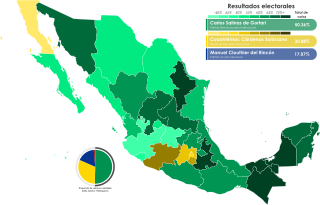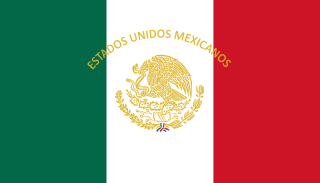Related Research Articles

The Party of the Democratic Revolution is a state-level social democratic political party in Mexico. The PRD originated from the Democratic Current, a political faction formed in 1986 from the Institutional Revolutionary Party (PRI). The PRD was formed after the contested general election in 1988, which the PRD's immediate predecessor, the National Democratic Front, believed was rigged by the PRI. This sparked a movement away from the PRI's authoritarian rule.

Miguel Alemán Valdés was a Mexican politician who served a full term as the President of Mexico from 1946 to 1952, the first civilian president after a string of revolutionary generals.

The Labor Party is a political party in Mexico. It was founded on 8 December 1990. The party is currently led by Alberto Anaya.

Eugenio Javier Hernández Flores is a Mexican politician affiliated with the Institutional Revolutionary Party (PRI). He was the mayor of Ciudad Victoria from 2001 to 2004 and governor of Tamaulipas from 2004 to 2010, and was also a federal deputy in 2000 and coordinator of the Financial Committee of Tomás Yarrington during his campaign. On May 27, 2015, he was indicted on charges of money laundering alongside his brother-in-law Oscar Gomez Guerra by the United States Department of Justice (USDOJ).
Álvaro Pérez Treviño was a Mexican politician, former member of the extinct Authentic Party of the Mexican Revolution, of which he was presidential candidate in 1994 election, in which he obtained 0.55% of the votes.

General elections were held in Mexico on 6 July 1988. They were the first competitive presidential elections in Mexico since the Institutional Revolutionary Party (PRI) took power in 1929. The elections were widely considered to have been fraudulent, with the PRI resorting to electoral tampering to remain in power.
This is a list of events that happened in 2008 in Mexico.

The president of Mexico, officially the president of the United Mexican States, is the head of state and head of government of Mexico. Under the Constitution of Mexico, the president heads the executive branch of the federal government and is the commander in chief of the Mexican Armed Forces. The office, which was first established by the federal Constitution of 1824, is currently held by Claudia Sheinbaum, who was sworn-in on October 1, 2024. The office of the president is considered to be revolutionary, in the sense that the powers of office are derived from the Revolutionary Constitution of 1917. Another legacy of the Mexican Revolution is the Constitution's ban on re-election. Mexican presidents are limited to a single six-year term, called a sexenio. No one who has held the post, even on a caretaker basis, is allowed to run or serve again. The constitution and the office of the president closely follow the presidential system of government.
This is a list of events that happened in 2009 in Mexico. The article also lists the most important political leaders during the year at both federal and state levels.

General elections were held in Mexico on 4 July 1982. The presidential elections were won by Miguel de la Madrid, who received 74% of the vote. In the Chamber of Deputies election, the Institutional Revolutionary Party won 299 of the 372 seats, as well as winning 63 of the 64 seats in the Senate election. Voter turnout was 75% in the presidential election and 73% and 66% for the two parts of the Chamber elections.

General elections were held in Mexico on 4 July 1976. José López Portillo was the only candidate in the presidential election, and was elected unopposed. In the Chamber of Deputies election, the Institutional Revolutionary Party won 195 of the 237 seats, as well as winning all 64 seats in the Senate election. Voter turnout was 65% in the Senate election and 62% in the Chamber election.
Enrique Olivares Santana was a Mexican teacher, diplomat, and politician who was governor of Aguascalientes (1962—1968), a member of the Institutional Revolutionary Party (PRI) and Secretary of the Interior.
Manuel Cavazos Lerma is a Mexican politician and economist from the Institutional Revolutionary Party (PRI), who served as governor of Tamaulipas from 1993–1999.
Events in the year 1982 in Mexico.
José Guadalupe Cervantes Corona was a Mexican politician and academic. He served as the Governor of Zacatecas from 1980 to 1986.

Adán Augusto López Hernández is a Mexican politician, lawyer and notary public who currently serves as a Senator of the Republic and President of the Political Coordination Board (JUCOPO) in the Mexican Senate, a role he assumed on September 1, 2024. He previously served as governor of Tabasco from January 2019 until August 2021, date on which he was appointed Secretary of the Interior by President Andrés Manuel López Obrador. López Hernández is a founding member of the political party MORENA and has formerly held office as senator and congressman in the Tabasco State Congress (2007-2009), the LXI Legislature of the Federal Chamber of Deputies (2009-2012) and the Senate in its LXIV Legislature (2012-2018).
The National Regeneration Movement, commonly referred to by its syllabic abbreviation Morena, is a major left-wing populist political party in Mexico. As of 2023, it is the largest political party in Mexico by number of members; it has been the ruling party since 2018, and it won a second term in the 2024 general election.
Events in the year 1988 in Mexico.
Events in the year 1986 in Mexico.
Amor a la medida, also known as El sastre, is a 1993 Mexican musical romantic drama film directed by Raúl Araiza and starring Los Tigres del Norte. It features a plot based on the 1950 Mexican film Vagabunda.
References
- ↑ "Archived copy" (PDF). Archived from the original (PDF) on 27 September 2011. Retrieved 2 July 2010.
{{cite web}}: CS1 maint: archived copy as title (link) - ↑ Camp, Roderic Ai (2006). Las elites del poder en México: perfil de una elite de poder para el siglo XXI (in Spanish). Siglo Veintiuno Editores. pp. 203–204, 247. ISBN 9682326303.
- ↑ Varela, Andrés Cervantes (1999). Elecciones 2000 - Andrés Cervantes Varela - Google Books. Plaza y Valdes. ISBN 9789688567302 . Retrieved 2 April 2012.
- ↑ Grayson, George W. (1990). Prospects for Democracy in Mexico. Transaction Publishers. p. 28. ISBN 1412832209 . Retrieved 3 July 2015.
- ↑ Cervantes Varela, Andrés (1999). Elecciones 2000: salvemos a México! : coalición opositora o continuismo priísta. Plaza y Valdes. p. 36. ISBN 9688567302.
- ↑ "1995 Foreign Consular Offices in the US: Section 6". Dosfan.lib.uic.edu. Archived from the original on 19 June 2010. Retrieved 2 April 2012.